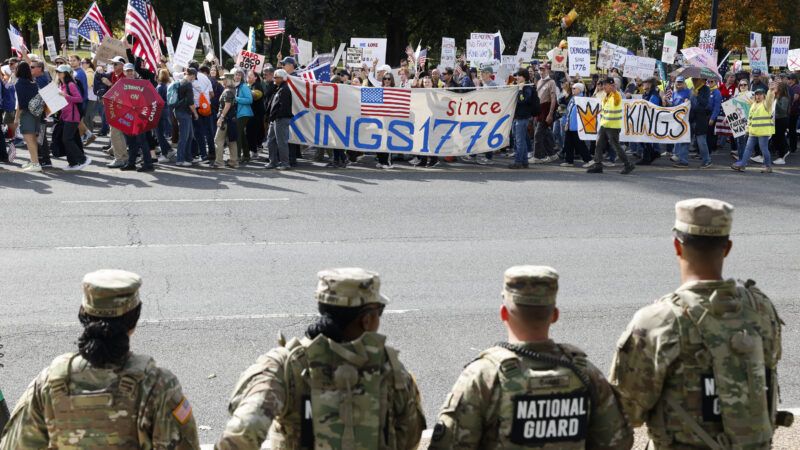A D.C. Man Was Arrested for Mocking National Guard Troops with Star Wars' 'Imperial March.' Now He's Suing.
Sam O'Hara went viral for playing "The Imperial March" behind groups of National Guard soldiers in D.C. He also says it led to him being illegally detained.

A Washington, D.C., resident who was handcuffed and detained in September for mocking National Guard soldiers by playing "The Imperial March" from Star Wars on his cellphone is suing the soldiers and police officers for their stormtrooper-like behavior.
The American Civil Liberties Union (ACLU) of D.C. filed a federal lawsuit today on behalf of Sam O'Hara, arguing that his detention violated his First and Fourth Amendment rights by cutting off his peaceful protest.
"The law might have tolerated government conduct of this sort a long time ago in a galaxy far, far away," O'Hara's lawsuit states. "But in the here and now, the First Amendment bars government officials from shutting down peaceful protests, and the Fourth Amendment (along with the District's prohibition on false arrest) bars groundless seizures."
After President Donald Trump deployed National Guard troops to D.C., O'Hara began following National Guard soldiers around playing "The Imperial March" on his cell phone as a form of protest. His lawsuit says O'Hara wanted "to encourage the public to view the deployment as a waste of tax dollars, a needless display of force, and a surreal danger."
According to his lawsuit, on September 11, O'Hara was tailing four Ohio National Guard soldiers and doing his usual bit.
"Less than two minutes after the protest began," the lawsuit says, "Sgt. [Devon] Beck turned around and said, 'Hey man, if you're going to keep following us, we can contact Metro PD and they can come handle you if that's what you want to do. Is that what you want to do?'"
O'Hara allegedly did not respond but continued to follow, at which point the Empire decided to strike back.
Beck called the Metropolitan Police Department (MPD) of Washington, D.C. The lawsuit claims that shortly after several MPD cars arrived. The MPD officers allegedly accused O'Hara of harassing the soldiers, and they detained and handcuffed him.
When O'Hara argued that he was engaged in protest, one of the MPD officers allegedly responded, "That's not a protest. You better define protest. This isn't a protest. You are not protesting."
However, recording and mocking law enforcement are both firmly protected by the First Amendment, as long as one doesn't interfere with their duties.
Supreme Court Justice William J. Brennan Jr. wrote in 1987, in a ruling striking down a Houston ordinance that made it unlawful to oppose or interrupt a police officer, that "the freedom of individuals verbally to oppose or challenge police action without thereby risking arrest is one of the principal characteristics by which we distinguish a free nation from a police state."
To put it another way, if you act like an autocratic villain when someone compares you to an autocratic villain, you just might be an autocratic villain.
According to his lawsuit, O'Hara was released after 15 to 20 minutes without charges.
"Armed National Guard should not be policing D.C. residents as we walk around our neighborhoods," O'Hara said in an ACLU of D.C. press release. "It was important to me not to normalize this dystopian occupation. Instead of respecting my right to protest, police officers handcuffed me so tightly my wrists were still marked and sore the next day. This shows the danger of deploying troops onto American streets: it puts all our basic rights at risk."
